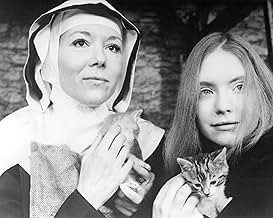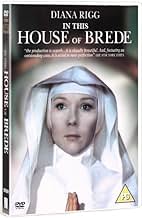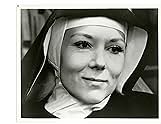AVALIAÇÃO DA IMDb
7,8/10
330
SUA AVALIAÇÃO
Adicionar um enredo no seu idiomaA well-to-do London businesswoman gives up her comfortable life, including the man who loves her, to become a cloistered Benedictine nun.A well-to-do London businesswoman gives up her comfortable life, including the man who loves her, to become a cloistered Benedictine nun.A well-to-do London businesswoman gives up her comfortable life, including the man who loves her, to become a cloistered Benedictine nun.
- Direção
- Roteiristas
- Artistas
- Indicado para 1 Primetime Emmy
- 1 indicação no total
Fanny Rowe
- Miss Bowman
- (as Frances Rowe)
Dearbhla Molloy
- Dame Beatrice
- (as Dervla Molloy)
Yasuko Nagazumi
- Mariko
- (as Yasuko Magazumi)
- Direção
- Roteiristas
- Elenco e equipe completos
- Produção, bilheteria e muito mais no IMDbPro
Avaliações em destaque
If I had never read the novel (and loved it), and if I had never lived the cloistered religious life (which I have), I would recommend this film without reserve.
My reservations are based on the following: Having lived in a cloister for over two years, I can tell you that, even in these post-Vatican II times, a postulant or novice would never be permitted to speak freely with another sister, especially an elder, without permission from her novice mistress. Recreations are not "free time", as depicted in the film; it is a daily get-together of the community as a whole, and it is encouraged that you converse in groups of at least three (you can talk to one other sister if you feel you have to, but certainly not for the whole recreation period). Also, silence being an essential and necessary aspect of contemplative monasticism, a sister, no matter what rank, would not sing out loud whenever and wherever she felt moved to do so, and especially not during work time. I could go on... but suffice it to say that this film is not an accurate depiction of cloistered life.
However, I do have positive feelings about this film. Even though it bears little resemblance in plot to the novel, it's still a good basic story in itself and is very well acted by an ensemble of wonderful actors. And, inaccurate of the life as it is, the film still evokes in me a nostalgic longing for the monastery, and I admit that I watch it for mainly that reason.
Oh, that the BBC would produce a mini-series of Godden's wonderful novel! That would be something to see. Godden was herself a Benedictine Oblate (lay persons connected by vows to a religious order), and her book is a loving and faithful tribute to Benedictine nuns everywhere.
My reservations are based on the following: Having lived in a cloister for over two years, I can tell you that, even in these post-Vatican II times, a postulant or novice would never be permitted to speak freely with another sister, especially an elder, without permission from her novice mistress. Recreations are not "free time", as depicted in the film; it is a daily get-together of the community as a whole, and it is encouraged that you converse in groups of at least three (you can talk to one other sister if you feel you have to, but certainly not for the whole recreation period). Also, silence being an essential and necessary aspect of contemplative monasticism, a sister, no matter what rank, would not sing out loud whenever and wherever she felt moved to do so, and especially not during work time. I could go on... but suffice it to say that this film is not an accurate depiction of cloistered life.
However, I do have positive feelings about this film. Even though it bears little resemblance in plot to the novel, it's still a good basic story in itself and is very well acted by an ensemble of wonderful actors. And, inaccurate of the life as it is, the film still evokes in me a nostalgic longing for the monastery, and I admit that I watch it for mainly that reason.
Oh, that the BBC would produce a mini-series of Godden's wonderful novel! That would be something to see. Godden was herself a Benedictine Oblate (lay persons connected by vows to a religious order), and her book is a loving and faithful tribute to Benedictine nuns everywhere.
10andrewjv
As a former Benedictine monk of 15 years who has visited many cloistered Benedictine monasteries of enclosed women religious, this movie is a wonderful depiction of the the rituals and formation of nuns in Benedictine monasteries. The ceremonies are very accurately depicted and there is none of that silly nun-sense (no pun intended!) that is often depicted in Hollywood versions of movies about nuns. I highly recommend this film and the books as well! The music and the chant are also wonderful.
Does anyone know what Abbey was used for the filming of the movie?
The copy of the movie that I have does not have the credits at the end so I can not figure out where it was filmed.
Does anyone know what Abbey was used for the filming of the movie?
The copy of the movie that I have does not have the credits at the end so I can not figure out where it was filmed.
Diana Rigg has always been one of my favourite actresses, going way back to 1960's "The Avengers" television series. I had originally seen this film when it was first released to American television in the 1970's, enjoyed it, and then as the years passed, and the film went out of distribution, forgot about it.
When "Brede" was reissued on VHS, I watched the movie again, and remembered how much I enjoyed it. Coincidentally, I managed to find a copy of Rumer Godden's novel, In This House of Brede and set down to read it. There are many plot differences between the novel and the film (I spent 200 pages reading waiting for the "movie" to start), but the central themes remain intact - the quest for individual spirituality, grief, loneliness, the questioning of one's personal decisions, jealousy, envy, discipline, and most importantly, love.
The character of Dame Phillipa (Diana Rigg) is one who feels deeply, but builds up very thick walls for her own protection. What impressed me most about Rigg's performance is that she manages to express her pain, grief, and inner turmoil while holding back the tears... just as I imagine Dame Phillipa would.
Dame Agnes (Pamela Brown) is extraordinary. (Having gone to a Catholic grade school run by Benedictine nuns, I can assure you that there are a few like Dame Agnes out there!) She reminds me very much of Gladys Cooper's character, Sister Maria Therese in The Song of Bernadette. She is of the "old school", resisting change, new ideas, people of worldly experience, and terribly jealous of Dame Phillipa. In the final reel, we do understand what makes Dame Agnes tick, and with that realisation, we can forgive her uncharitable behaviour.
My complaints about the film are few. It looks very much like a dated made-for-tv film from the 1970's today. The music score, which is a symphonic-pop amalgamation, does not hold up well and is at times intrusive. There was also much left out of the book when it was transformed into the screenplay that could have been filmed with an additional 30-40 minutes running time.
The beauties of this film far outweigh its shortcomings. After viewing it, I suggest you find a copy of the novel (if you can, it's currently out of print in the United States) and enjoy the author's original, and more extensive story.
When "Brede" was reissued on VHS, I watched the movie again, and remembered how much I enjoyed it. Coincidentally, I managed to find a copy of Rumer Godden's novel, In This House of Brede and set down to read it. There are many plot differences between the novel and the film (I spent 200 pages reading waiting for the "movie" to start), but the central themes remain intact - the quest for individual spirituality, grief, loneliness, the questioning of one's personal decisions, jealousy, envy, discipline, and most importantly, love.
The character of Dame Phillipa (Diana Rigg) is one who feels deeply, but builds up very thick walls for her own protection. What impressed me most about Rigg's performance is that she manages to express her pain, grief, and inner turmoil while holding back the tears... just as I imagine Dame Phillipa would.
Dame Agnes (Pamela Brown) is extraordinary. (Having gone to a Catholic grade school run by Benedictine nuns, I can assure you that there are a few like Dame Agnes out there!) She reminds me very much of Gladys Cooper's character, Sister Maria Therese in The Song of Bernadette. She is of the "old school", resisting change, new ideas, people of worldly experience, and terribly jealous of Dame Phillipa. In the final reel, we do understand what makes Dame Agnes tick, and with that realisation, we can forgive her uncharitable behaviour.
My complaints about the film are few. It looks very much like a dated made-for-tv film from the 1970's today. The music score, which is a symphonic-pop amalgamation, does not hold up well and is at times intrusive. There was also much left out of the book when it was transformed into the screenplay that could have been filmed with an additional 30-40 minutes running time.
The beauties of this film far outweigh its shortcomings. After viewing it, I suggest you find a copy of the novel (if you can, it's currently out of print in the United States) and enjoy the author's original, and more extensive story.
How well I remember this film! I was fifteen years of age and I had read the book. I was attending St Mary's Abbey Grammar School in Mill Hill in Londond when our headmistress gave us the exciting news that a film was to be made in the school. Since it was an all girls school there was as much excitement in the electricians, floor crew, best boys and males in general as there was in the presence of Diana Rigg. To her credit she was very kind to a bunch of tongue-tied schoolgirls and made no objection to our sitting in and watching two of the scenes being shot. I'm not sure if my memory serves me correctly but as far as I recall it was our Sister Maureen who sang for Judy Bowker when she was taking her vows. I doubt we learned much during that time, there were way too many distractions. I saw the film once, many years ago but I really must make an effort to watch it again.
Diana Rigg made a peerlessly suave secret agent. For the 60's British TV series "The Avengers," she never won a single Emmy (They always went to Martin Landau's wife-at-the-time Barbara Bain for "Mission Impossible.), but there was no one who matched the simmering confidence and shimmering elegance of Mrs. Emma Peel. No matter what the challenge put before her, Rigg remained unshaken.
"In This House of Brede" posed a much different challenge than the ones to which Rigg was accustomed: doffing the miniskirts and knee-length boots and playing a woman who had lost both husband and daughter and decides to leave her successes in the workplace for life as a Benedictine nun. Her Dame Philippa is well-schooled (She already knows Latin before entering the convent.); experienced in the business world (So she intimidates Dame Agnes (Pamela Brown), one of the senior nuns who feels her advanced age poses a serious problem at being settled in the cloister.), and very determined (although she has barely recovered from the loss of her daughter in a car accident). The superior of Brede who encouraged Philippa to consider religious life dies as she enters the postulancy. She's lucky, however, that the congregation has the good sense to elect a kind, fair-minded woman (Gwen Watford) to lead them, and help Philippa through the most trying times of her novitiate. It's the challenge to form a loving, but disinterested life at Brede that threatens to capsize Philippa's hard-earned equanimity, when a beautiful, young prospect (Judy Bowker who was equally as captivating in "The Shooting Party") arrives. Memories of her daughter well up to recall feelings she thought she had put behind her years ago.
It's easy to become impatient with this movie's prudence; the in-fighting and petulance among the nuns are dispelled without much fuss. "In This House of Brede" never makes much of these women's triumphs. To find any dramatic tension, you need to look to Rigg's pale, drawn face or Brown's wide, but tired and stricken eyes. Yet the combination of this even mindedness and struggle is simultaneously calming and tonic. The gaggle of giggling novices Dame Philippa ushers back to their native Japan bring a sense of renewed hope to the order. Even Dame Agnes with her rankled nerves, and hurt feelings, and petty jealousies finds peace in the end. It gives the rest of us cause for celebration: that, with God's help, any of us can conquer ourselves--and, we hope, as these women do--elegantly.
"In This House of Brede" posed a much different challenge than the ones to which Rigg was accustomed: doffing the miniskirts and knee-length boots and playing a woman who had lost both husband and daughter and decides to leave her successes in the workplace for life as a Benedictine nun. Her Dame Philippa is well-schooled (She already knows Latin before entering the convent.); experienced in the business world (So she intimidates Dame Agnes (Pamela Brown), one of the senior nuns who feels her advanced age poses a serious problem at being settled in the cloister.), and very determined (although she has barely recovered from the loss of her daughter in a car accident). The superior of Brede who encouraged Philippa to consider religious life dies as she enters the postulancy. She's lucky, however, that the congregation has the good sense to elect a kind, fair-minded woman (Gwen Watford) to lead them, and help Philippa through the most trying times of her novitiate. It's the challenge to form a loving, but disinterested life at Brede that threatens to capsize Philippa's hard-earned equanimity, when a beautiful, young prospect (Judy Bowker who was equally as captivating in "The Shooting Party") arrives. Memories of her daughter well up to recall feelings she thought she had put behind her years ago.
It's easy to become impatient with this movie's prudence; the in-fighting and petulance among the nuns are dispelled without much fuss. "In This House of Brede" never makes much of these women's triumphs. To find any dramatic tension, you need to look to Rigg's pale, drawn face or Brown's wide, but tired and stricken eyes. Yet the combination of this even mindedness and struggle is simultaneously calming and tonic. The gaggle of giggling novices Dame Philippa ushers back to their native Japan bring a sense of renewed hope to the order. Even Dame Agnes with her rankled nerves, and hurt feelings, and petty jealousies finds peace in the end. It gives the rest of us cause for celebration: that, with God's help, any of us can conquer ourselves--and, we hope, as these women do--elegantly.
Você sabia?
- CuriosidadesDiana Rigg, Dennis Quilley and Nicholas Clay also appeared together in "Evil Under the Sun"
- ConexõesFeatured in The 27th Annual Primetime Emmy Awards (1975)
Principais escolhas
Faça login para avaliar e ver a lista de recomendações personalizadas
Detalhes
Contribua para esta página
Sugerir uma alteração ou adicionar conteúdo ausente


















